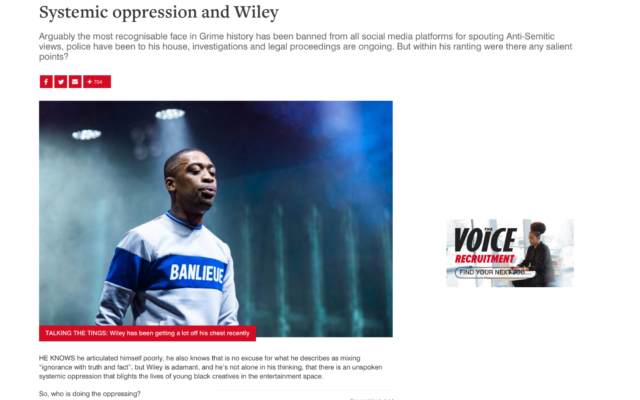Black newspaper accused of ‘echoing and amplifying Wiley’s antisemitic tropes’
The Voice published an interview with the grime artist in which it asks: 'Within his ranting were there any salient points?'
Jack Mendel is the former Online Editor at the Jewish News.
A newspaper serving black Brits has been accused of running a piece that “echoed and amplified Wiley’s racist tropes”.
The Voice came in for criticism on Wednesday after publishing an interview with the grime artist, who was banned from Twitter, Facebook and Instagram over his antisemitic comments on the platforms.
The piece by Joel Campbell, entitled ‘Systemic oppression and Wiley‘, asks “within his ranting were there any salient points?”
It also makes claims that black artists need Jewish lawyers to be successful and that Jewish people see them as “slaves”.
Following the interview, which remains online, Board of Deputies President Marie van der Zyl said: “We are saddened and concerned that The Voice, with its long history of campaigning against racial injustice, has run a piece that echoed and amplified Wiley’s racist tropes, rather than challenging them. We urge the paper to reflect, rectify and move focus to mutual solidarity.”
Stephen Bush, who is leading the Board Commission into Racial Inclusivity in the community, wrote to George Ruddock, Acting Managing Director of the editor of the Voice, relaying his concerns.
Posting on Facebook, he says: ‘A regrettable and unavoidable challenge of both our jobs is how to handle expressions of outright bigotry and hate speech from famous and significant figures. Joel Campbell’s interview with Wiley not only fails to meet that challenge, but appears to revel in not doing so.”
Citing remarks made by both the interviewer and Wiley in the piece, Bush says: “Campbell writes that “the hypothesis you need to get a Jewish lawyer in order to progress in the music business may be a complete fallacy” as he hasn’t “done the numbers” on the theory, adding that he has “never seen anyone Jewish refute or confirm this”, and perhaps it is a “discussion that needs to be had”, asking “why has this feeling, if it is demonstrated that the stats and facts don’t back it up, not been dispelled?”
“The claim is a self-evidently absurd conspiracy theory”.

Bush adds however, he “would be happy to meet with you to discuss further how this article came to be and how we can work together to prevent a repeat and to learn lessons from this.”
In the piece, the interviewer says Wiley “knows he articulated himself poorly”, but he is “not alone in his thinking, that there is an unspoken systemic oppression that blights the lives of young black creatives in the entertainment space.”
He claims “questions were not being posed from an ignorant perspective, some of the views espoused by Wiley are the great unsaid outside of the black community.”
At one point, Campbell says, “putting anything remotely near considered antisemitic to one side…not too many seem prepared to vocalise their consternation for some of the recurring themes Wiley believes is the stranglehold one community seems to have over another in particular relation but not confined to, the music business.”
Wiley tells him: “what I am saying is systemic and when I say it, they pretend they don’t know what I am saying.”
When Campbell asks Wiley who he means by “they”, the musician responds “without generalising… it’s the people I work with in the entertainment and music industry, the Jewish community”.
“They still see us as slaves. Slavery hasn’t stopped it’s just dressed up in a million pound record deal….”.
Campbell claims “a picture of black people has been sold and fostered through the lens of negativity” and that “Jewish communities lay claim to the same disconcerting and often demeaning rhetoric plaguing their existence, so how did Wiley get here?”
“Unless there’s some or indeed a whole heap of truth in what he is saying, what’s stopping this discussion from being had between ‘them’ and the artists?”
The Voice was approached for comment.

Thank you for helping to make Jewish News the leading source of news and opinion for the UK Jewish community. Today we're asking for your invaluable help to continue putting our community first in everything we do.
For as little as £5 a month you can help sustain the vital work we do in celebrating and standing up for Jewish life in Britain.
Jewish News holds our community together and keeps us connected. Like a synagogue, it’s where people turn to feel part of something bigger. It also proudly shows the rest of Britain the vibrancy and rich culture of modern Jewish life.
You can make a quick and easy one-off or monthly contribution of £5, £10, £20 or any other sum you’re comfortable with.
100% of your donation will help us continue celebrating our community, in all its dynamic diversity...
Engaging
Being a community platform means so much more than producing a newspaper and website. One of our proudest roles is media partnering with our invaluable charities to amplify the outstanding work they do to help us all.
Celebrating
There’s no shortage of oys in the world but Jewish News takes every opportunity to celebrate the joys too, through projects like Night of Heroes, 40 Under 40 and other compelling countdowns that make the community kvell with pride.
Pioneering
In the first collaboration between media outlets from different faiths, Jewish News worked with British Muslim TV and Church Times to produce a list of young activists leading the way on interfaith understanding.
Campaigning
Royal Mail issued a stamp honouring Holocaust hero Sir Nicholas Winton after a Jewish News campaign attracted more than 100,000 backers. Jewish Newsalso produces special editions of the paper highlighting pressing issues including mental health and Holocaust remembrance.
Easy access
In an age when news is readily accessible, Jewish News provides high-quality content free online and offline, removing any financial barriers to connecting people.
Voice of our community to wider society
The Jewish News team regularly appears on TV, radio and on the pages of the national press to comment on stories about the Jewish community. Easy access to the paper on the streets of London also means Jewish News provides an invaluable window into the community for the country at large.
We hope you agree all this is worth preserving.






















